Related Research Articles
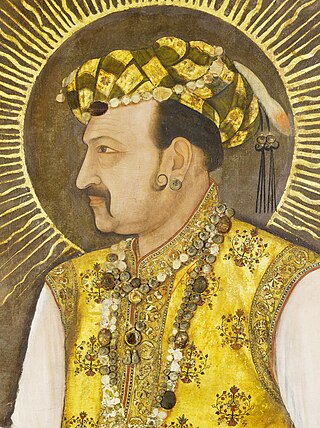
Nur-ud-din Muhammad Salim, known by his imperial name Jahangir, was Emperor of Hindustan from 1605 until his death in 1627, and the fourth Mughal Emperor.
A heroine is a female hero.

Mumtaz Mahal was the empress consort of Mughal Empire from 1628 to 1631 as the chief consort of the fifth Mughal emperor, Shah Jahan. The Taj Mahal in Agra, often cited as one of the Wonders of the World, was commissioned by her husband to act as her tomb.
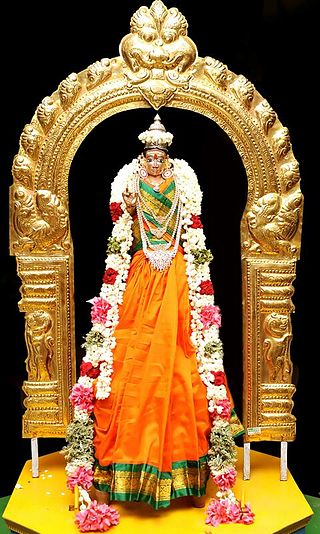
Draupadi, also referred to as Krishnā, Panchali, and Yajnaseni, is the main female protagonist of the ancient Indian epic Mahabharata, and the wife of the five Pandava brothers—Yudhishthira, Bhima, Arjuna, Nakula, and Sahadeva. She is noted for her beauty, courage, polyandrous marriage, and bhakti (devotion) for Krishna.

Awadh, known in British historical texts as Avadh or Oudh, is a historical region in northern India, now constituting the northeastern portion of Uttar Pradesh. It is roughly synonymous with the ancient Kosala region of Hindu, Buddhist, and Jain scriptures.
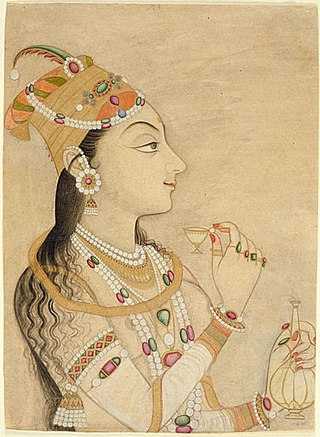
Nur Jahan, born Mehr-un-Nissa was the twentieth wife and chief consort of the Mughal emperor Jahangir.

Begum Hazrat Mahal, also known as the Begum of Awadh, was the second wife of Nawab of Awadh Wajid Ali Shah, and the regent of Awadh in 1857–1858. She is known for the leading role she had in the rebellion against the British East India Company during the Indian Rebellion of 1857.

Mariam-uz-Zamani, commonly known by the misnomer Jodha Bai, was the chief consort and principal Hindu wife as well as the favourite wife of the third Mughal emperor, Akbar. She was also the longest-serving Hindu empress of the Mughal Empire with a tenure of forty-three years (1562–1605).

Nadira Banu Begum was a Mughal princess and the wife of Crown Prince Dara Shikoh, the eldest son and heir-apparent of the Mughal emperor Shah Jahan. After Aurangzeb's rise to power, Dara Shikoh's immediate family and supporters were in danger. Nadira died in 1659, a few months before her husband's execution, and was survived by two sons and a daughter.
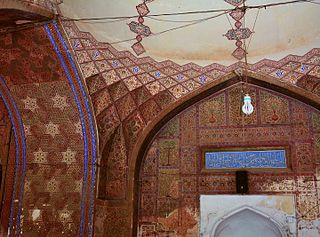
Begum Shahi Mosque, officially the Mosque of Mariyam Zamani Begum, is a 17th-century mosque situated in the interior walled city of Lahore in Punjab, Pakistan. Constructed by Mughal empress Mariam-uz-Zamani, chief consort of Akbar. The mosque was built between 1611 and 1614 during the reign of Jahangir.

Hamida Banu Begum was the empress consort of the second Mughal emperor Humayun and the mother of his successor, the third Mughal emperor Akbar. She was bestowed the title of Mariam Makani, by her son, Akbar. She also bore the title of Padshah Begum during the reign of Akbar.
Begum is a female title which is also used in Mirza families/lineages, Daughter of Beg or Wife of Beg, a given name and surname.

Manavati Bai, also spelled Manvati Bai,, better known by her title, Jagat Gosain, was the second wife and the empress consort of the fourth Mughal emperor Jahangir and the mother of his successor, Shah Jahan.
Ruqaiya Sultan Begum was the first wife and one of the chief consorts of the third Mughal emperor, Akbar.

Salima Sultan Begum was the third wife and chief consort of the Mughal emperor Akbar, and the granddaughter of Babur.
Bega Begum was Empress consort of the Mughal Empire from 26 December 1530 to 17 May 1540 and 22 June 1555 to 27 January 1556 as the first wife and chief consort of the second Mughal emperor Humayun. She was known as Zan-i-Kalan being the first wife of Humayun and was also known as Haji Begum after she performed the Hajj pilgrimage.

The Panchakanya is a group of five iconic women of the Hindu epics, extolled in a hymn and whose names are believed to dispel sin when recited. They are Ahalya, Draupadi, Kunti, Tara, and Mandodari. While Draupadi and Kunti are from the Mahabharata, Ahalya, Tara, and Mandodari are from the Ramayana. The Panchakanya are regarded to be ideal women who exemplify perfect wives in Hinduism.
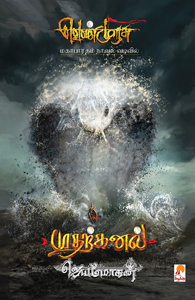
Venmurasu is a Tamil novel by writer Jeyamohan. It is a modern renarration of the Indian classical epic Mahābhārata.
Asmat Begum was the wife of Mirza Ghiyas Beg, the Prime minister of the Mughal emperor Jahangir, and the mother of Mughal empress Nur Jahan, the power behind the emperor. Asmat Begum was also the paternal grandmother of Empress Mumtaz Mahal, for whom the Taj Mahal was built.
References
- ↑ "Ira Mukhoty". Aleph Book Company. 29 December 2016. Retrieved 2 April 2018.
- ↑ "Heroine-ism". The Asian Age. 11 January 2017. Retrieved 2 April 2018.
- 1 2 "Ira Mukhoty". Times of India. 3 November 2017. Retrieved 2 April 2018.
- ↑ Roy, Vaishna (25 March 2017). "Ascent of a woman". The Hindu. Retrieved 2 April 2018.
- ↑ Rose, Jaya Bhattacharji (7 January 2018). "2018: All set to sparkle with new voices". Asian Age.
- ↑ Wadhwa, Soni (17 August 2020). ""Akbar: The Great Mughal" by Ira Mukhoty" . Retrieved 4 September 2020.
- ↑ Kochhar, Ritika (25 September 2021). "The queen of Dharma: Review of Ira Mukhoty's Song of Draupadi". The Hindu. Retrieved 9 October 2021.
- ↑ Mukhoty, Ira (2 August 2021). "This novel asks what would have happened if the Mahabharata had been the story of the women in it". Scroll.in. Retrieved 9 October 2021.(Book extract)
- ↑ Sharma, Parvati (16 August 2024). "'We really need to look at the myths we have been left with,' says Ira Mukhoty, author of The Lion and the Lily". The Hindu. ISSN 0971-751X . Retrieved 27 October 2024.